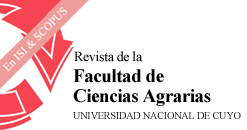Artículo de revista
Céspedes de estadios de fútbol
Mendoza (Argentina)Grass of the soccer stadiums
Mendoza (Argentina)
Méndez, Eduardo
-  Enviar un email al autor
Enviar un email al autor
Publicado en el 2002 en
Revista de la Facultad de Ciencias Agrarias,
Vol. 34, no. 2
Idioma:
Español
Resumen:
Español
Se considera los estados de desarrollo
de los céspedes de estadios de fútbol
en Mendoza (Argentina). Desde un punto de
vista fitosociológico se determinan dos grupos
de plantas: Molinio-Arrhenatheretea R.
Tx. 1937 (campos húmedos y pisoteados,
con vegetación subnitrófila e higrófita) y
Stellarietea mediae R. Tx. 1950 (vegetación
arvense de los cultivos). Se indican las etapas
dinámicas que se producen por
sobrepisoteo y labores culturales. Del análisis
se desprende que:
1. El sobrepisoteo y falta de cuidados culturales
conducen a la pérdida de la cubierta vegetal y a
la formación de peladeros sin vegetación.
2. La comunidad de Cynodon dactylon L., junto
con elementos de la Molinio-Arrhenatheretea,
es la más aceptada. Su cobertura representa
el mejor estado del campo.
3. Adecuadas prácticas culturales asegurarían
el mantenimiento y/o conservación de
los céspedes favoreciendo la práctica del
deporte y aportando belleza escénica.
Inglés
This work to contribute to inform about the
development stages of turfs in the soccer
stadiums of Mendoza (Argentina). From a
phytosociological point of view two groups of
plants are determined: Molinio-Arrhenatheretea
R. Tx. 1937 (humid and trampled down fields,
with subnitrophilous and hygrophyte vegetation)
and Stellarietea mediae R. Tx. 1950 (ruderal
vegetation in cultivated fields). Here are
indications on the dynamic stages produced by
over trampling and cultural works.From the
analysis follows that:
1. Over trampling and lack of cultural care produce
a loss of the vegetal cover and leads to
the formation of barren soil without vegetation.
2. The Cynodon dactylon L. community
together with elements of the Molinio-
Arrhenatheretea community are the better
accepted, and its maximum coverage
represent the best fiel stages.
3. With the practice of cultural work and a
better management, the maintenance and
conservation of the fields would be ensured,
leading not only to a nicer landscape but
also to a better practice of sports.
Disciplinas:
Palabras clave:
Descriptores:
Notas:
Trabajo presentado en la reunión: XX Argentina y I Chileno-Argentina de Ecología. Bariloche.
Argentina. 2001.
Méndez, Eduardo (2002) "Céspedes de estadios de fútbol: Mendoza (Argentina)". En: Revista de la Facultad de Ciencias Agrarias, Vol. 34, no. 2, p. 93-100.
Dirección URL del artículo: https://bdigital.uncu.edu.ar/2872.
Fecha de consulta del artículo: 18/05/24.

Este obra está bajo una Licencia Creative Commons Atribución-NoComercial-CompartirIgual 3.0 Unported.
Conozca más sobre esta licencia >



